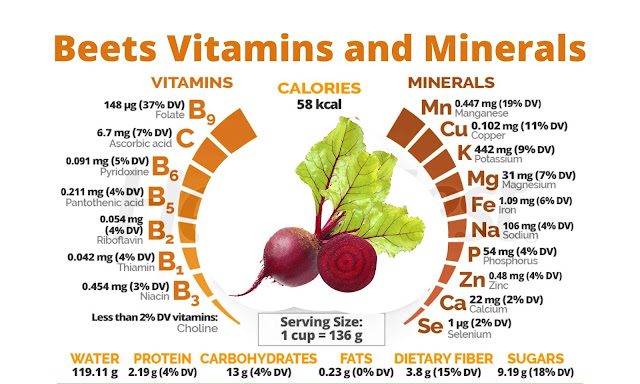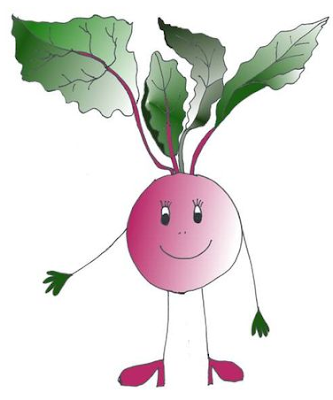 |
| Beets Vitamins and Minerals |
Rich and earthy, beets are one of the world's most popular root vegetables in one of the world's healthiest foods. These gorgeous grandiloquent-red bulbs are packed with a wealth of vitamins, minerals, and composites, making the beet a healthy addition to your diet.
No matter how you prepare it, you can juice it or blend it into a stimulating drink or smoothie.
Now, as with all vegetables, cooking beets can cause nutrient loss. However, beet powder is also available, If you do not have a blender or juicer.
That's my go-to because it's super quick and easy. Beets contain nitric oxide, the powerhouse molecule that drives your body forward not to be confused with nitrous oxide, aka laughing gas.
Remember the nitrogen cycle from school? Inorganic nitrate is found in all plants with leafy green vegetables like spinach and celery, but also beets, which actually have the highest amounts. Nitric oxide plays an essential role in your overall physical health. It lets your blood transport nutrients and oxygen across your body efficiently by controlling your blood flow.
In the immune function and energy levels, it plays a role. Because of its involvement in mitochondrial function, nitrates are also a boon for heart health, having long been associated with lower resting blood pressure, increasing your ingestion of nitrates can slow the cardiovascular aging process, an important marker for your overall heart health.
When you eat or drink beets, bacteria on your tongue, along with other enzymes in your body, convert nitrate ions to nitric oxide, which your body can also produce from arginine, which is an amino acid. Citrulline is another amino acid that is produced by your body, which is converted by your body into arginine.
This process provides about half the nitric oxide in your body with the help of your diet. Beets and beet juice aren't just a fantastic source of nitrates. It also offers a wealth of other essential minerals, including iron, folate, magnesium, and zinc.
Beet Can also Enhance Athletic Performance
 |
| Beetroot |
Research is still ongoing, with more comprehensive studies needed, but so far, the results are highly encouraging. These studies typically examine results from a single dose of beet juice.
However, many have not determined the exact dose of nitrate within the beet juice given to participants. This means that there's little knowledge on the optimum dose for performance.
In one study that did determine the nitrate dose given, eight men drank half a liter of beet juice a day for six days. Results showed that each subject bettered their time to complete prostration despite reduced oxygen consumption, a finding that is harmonious with other studies available moment.
In another study, using water as a control treatment, they took ten young men and gave them 70ml, 140ml, and 280ml beet juice while resting and just before moderate high-intensity cycling exercise. This study showed that plasma nitrate concentration rose corresponding to the dose given, reaching a peak around two to 3 hours after drinking. Researchers also found that the lowest volume, the 70 ML, did not have any impact on performance.
At the same time, the advanced doses led to lower oxygen consumption and bettered performance compared to the control. Preliminary research on nitrate ingestion, often using beet juice, demonstrated clear performance benefits, one that other studies supported. Presently, more research is still needed for a clear picture. But for now, studies show encouraging results, particularly with youthful men of average fitness.
For men who are already at peak fitness, however, studies so far don't show any benefit.
What the research consistently shows is that by drinking beet juice for one week or even just a few hours before exercise, the body's plasma nitrate concentration increases as the resting blood pressure decreases.
During exercise, oxygen consumption falls a little bit, and the overall performance of the exercise is judged to have bettered markedly.
Researchers believe these findings result from enhanced muscle performance, an increase in efficient mitochondrial ATP production, and more blood flow to the muscles.
What are the General Benefits of Beets Juices?
 |
| Beets Juices |
A 2015 study showed that beet use offered benefits to those with heart failure. The results noted that the subjects, each of whom suffered from this condition, experienced a 13% increase in muscle power just 2 hours after taking beet juice.
In 2011, another study, which was done on rats, found that beetroot had a positive impact on lowering cholesterol not just lowering the total cholesterol, but also triglycerides, all while actually increasing the good cholesterol to HDL cholesterol.
So this study also found that beets can reduce oxidative liver stress. The researchers concluded that these results are due to the phytonutrients found in the root vegetable.
Research has even demonstrated that nitrates might slow the terrible progress of dementia. In 2011, test subjects consumed a high nitrate diet with beet juice.
MRI scans of their brains showed an apparent increase in blood flow to their frontal lobes, which deal with cognitive processes like behavior and thinking.
Again, more research is needed, but preliminary results do look encouraging.
Can You Have Too Many Good Things?
 |
| Beet Root |
Low blood pressure people can skip their pressure problem by the consumption of beet juice. Nitrates do, after all, lower blood pressure. Also, if you're prone to kidney stones, you also have to be careful because they have high concentrations of oxalate.
In your urine, Oxalate forms the crystals that can eventually turn into stones, which can make a grown man cry.
Currently, there are no identified risks for adverse health consequences with an increased nitrate intake. One linked exception to this is those with heart complaints on traditional specifics like nitroglycerin that impact the body's metabolism of nitric oxide.
Related Post:
What is the Real Secret to Losing Weight,

إرسال تعليق